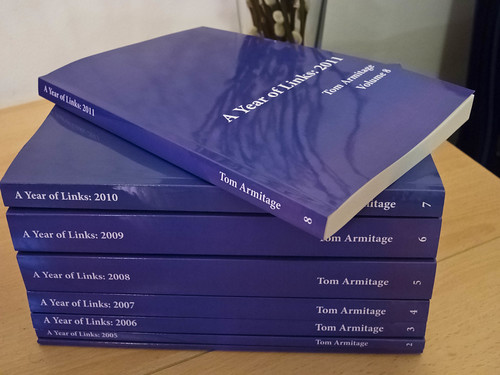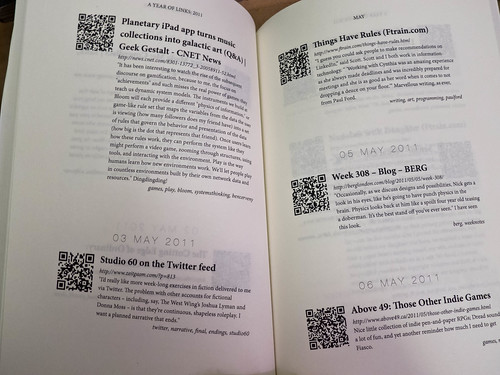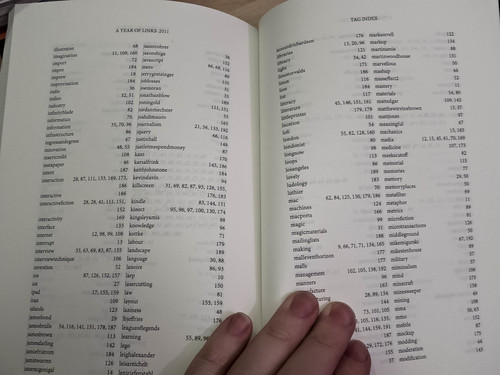-
"A one-person business is an exercise in long-term anxiety management, so I would say if you are already an anxious person, go ahead and start a business. You're not going to feel any worse. You've already got the main skill set of staying up and worrying, so you might as well make some money.
Running an online service solo puts one in the coffin corner between the Dunning Kruger effect and impostor syndrome. On some days you feel the correct but paralyzing sense that you are in way over your head. On other days, you'll feel like you're surfing on waves of liquid competence, doing flips, until you destroy something important.
In between the two is a zone of narrow, focused productivity that I hope one day to find."
Happy birthday to my favourite software as a service.
-
Oh, awesome: a Pinboard Share extension for iOS 8.
-
New Danny Macaskill video: off-road (off ALL the roads) in Skye. Remarkable. Also: so much dronecam in biking videos now. (Nicely shot, thoguh).
-
Really, really useful: a tool from @mnot to test headers, caching, and responses to webpages. Will be using this a lot in future, am sure.
-
"The water that falls on you from nowhere when you lie is perfectly ordinary, but perfectly pure. True fact. I tested it myself when the water started falling a few weeks ago. Everyone on Earth did. Everyone with any sense of lab safety anyway. Never assume any liquid is just water. When you say “I always document my experiments as I go along,” enough water falls to test, but not so much that you have to mop up the lab. Which lie doesn’t matter. The liquid tests as distilled water every time." A truly lovely short story from John Chu.
-
The most useful tips in here: set the right headers; set the body of the response to an enumerator and it'll iterate over it, streaming it.
-
Some great Chess writing from Slate.
-
"‘If all that survives of our fatally flawed civilization is the humble paper clip, archaeologists from some galaxy far, far away may give us more credit than we deserve,’ the design critic Owen Edwards argues in his book Elegant Solutions." An excerpt from a Joe Moran essay on the paperclip.
-
"pup is a command line tool for processing HTML. It reads from stdin, prints to stdout, and allows the user to filter parts of the page using CSS selectors.
Inspired by jq, pup aims to be a fast and flexible way of exploring HTML from the terminal." That looks great.
-
"Something that journalists sometimes do is publish a disclosure statement. It’s sort of like an About Me page except it’s a listing of all their conflicts of interest—all the areas of coverage where you might have good reason to think they should not be trusted. It’ll say things like I once worked at Google or I’m married to an employee of Microsoft. I have never written one of these but I have fantasies about doing a comprehensive one. It would be the length of a novel, I think. An endless and yet incomplete litany of all the blood, privilege, history, and compromise on my hands." I could have quoted lots of this, but I chose this. It's good. It encapsulates the beginnings but not ends of lots of thoughts, and reminds me why, right now, I'm afraid of assuming anything about anything, why stereotyping "big companies" as being identical isn't just inaccurate but also unhelpful, and why the point of boundaries is that they always exclude _somebody_.
-
"Hatoful Boyfriend is the Fifa of pigeon romance and you should buy it for that reason alone." I'm loving the attention Hatoful Boyfriend is getting in the media; this review by Grant Howitt is charming, informative, and on the Guardian website. Brilliant.
-
Cracking interview with George Saunders, from 2011 (so pre-Tenth of December). Lots about the craft of writing, and about what Just Turning Up looks like. Also, his imaginary writing class in which Hemingway punches everybody out made me laugh out loud.
-
"Of course this is pure anthropomorphization. Bits don’t have wills. But they do have tendencies." This piece by Kevin Kelly is great – though this line neatly explains my suggestion that 'things' sometimes have 'desires' better than I ever have before.
-
Good to know SES can just be integrated as an ActionMailer delivery method.
-
"It is pleasant to work on something that people draw benefit from. It is especially pleasant to work on something lasting. And I enjoy the looking-glass aspect of our industry, where running a mildly profitable small business makes me a crazy maverick not afraid to break all the rules." Pinboard is – obviously – one of my favourite products. And yes, I love the tone of Maciej's "brand" that he's built. But I also love how straightforward he is about describing the business and process of making something that Just Works and doesn't have ideas beyond being solid and dependable.
A Year of Links: Your Questions Answered!
04 March 2012
Following writing about my books to catalogue each year of my bookmarks, several readers had questions, which (rather than responding to in a comments thread), I thought I’d get around to here.
- Matt Edgar commented on the thickness of the spines, and what they represented in terms of my time/attention each year. All I can say is: I got a bit better at the process (more on this later) as time went on; I got quicker at both reading and writing. Also, during my time at Berg (2009-2011), part of my job was writing and researching, so the size of those volumes is in part because I had deliberate time during my work for reading and bookmarking.
- James Adam asked if the body text is from Pinboard or the page. It’s usually a combination of both, with the majority being a salient quotation.
If you’ve ever seen the format I use for my links, it tends to be a long quotation followed by a single line or two. James mentioned this because it seemed like a lot of writing. To which my answer is: it is and it isn’t. It’s a lot of words, but most of them aren’t mine.
To explain, it’s probably worth talking a little about how I bookmark:
I have the Safari extension for Pinboard installed. When I’m reading a page I like, or have found useful, I highlight a particularly salient quotation and click the extension button. This loads the Pinboard form with the contents of the clipboard loaded into the body copy field. I then wrap it in quotation marks, and perhaps add the first line or two of commentary that comes into my head. Then, I fill out the tags – as fast as I can, with the first thing that comes into my head. This tends, for me, to be the most valuable way of tagging.
The time-consuming part is reading the articles; I try to make bookmarking as lightweight as possible.
Bookmarks are published to this site via Postalicious.
So: whilst it looks like a lot of content, most of it is not mine, but it is copied/pasted into Pinboard. Really, though, I’ve got this down to a fine, swift art.
- In answer to Joel and Dave: I used Lulu for printing. I simply uploaded the completed PDFs to them for the inners. The covers were made in Photoshop, a bit by hand, and a lot by maths (because I wanted to use the same typeface on the cover that I do in the book.
- Justin Mason asked about cost. The first book, which is the pamphlet at the bottom for 2004, is about 30 pages, and cost around £2. The largest volumes – 2008/2009 – cost £7 or £8. 2010, which is volume 7, and my first proof of concept, was about £4.50. It was about £30 for the lot, plus delivery, though I saved a bit through some canny Lulu discount codes that I had.
And, finally, a big shout-out to Les Orchard, as the first person who wasn’t me to get the code up-and-running and make some books!
A Year of Links
26 February 2012
I made a book.
Or rather, I made eight books.
If you’ve read this site for any particular length of time, you’ll be aware that I produce a lot of links. Jokes about my hobby being “collecting the entire internet” have been made by friends.
I thought it would be interesting to produce a kind of personal encylopedia: each volume cataloguing the links for a whole year. Given I first used Delicious in 2004, that makes for eight books to date.
Each link is represented on the page with title, URL, full description, and tags.
Yes, there’s also a QR code. Stop having a knee-jerk reaction right now and think carefully. Some of those URLs are quite long, and one day, Pinboard might not exist to click on them from. Do you want to type them in by hand? No, you don’t, so you may as well use a visual encoding that you can scan with a phone in the kind of environment you’d read this book: at home, in good lighting. It is not the same as trying to scan marketing nonsense on the tube.
Each month acts as a “chapter” within the book, beginning with a chapter title page.
Each book also contains an index of all tags, so you can immediately see what I was into in a year, and jump to various usage.
Wait. I lied. I didn’t make eight books. I made n books. Or rather: I wrote a piece of software to ingest an XML file of all my Pinboard links (easily available from the Pinboard API by anyone – you just need to know your username and password). That software then generates a web page for each book, which is passed into the incredible PrinceXML to create a book. Prince handles all the indexing, page numbering, contents-creation, and header-creation. It’s a remarkable piece of software, given the quality of its output – with nothing more than some extended CSS, you end up with control over page-breaks, widows and orphans, and much more.
The software is a small Sinatra application to generate the front-end, and a series of rake tasks to call Prince with the appropriate arguments. It’s on Github right now. If you can pull from Github, install Prince, and are comfortable in the terminal, you might find it very usable. If you don’t, it’s unlikely to become any more user-friendly; it’s a personal project for personal needs, and whilst Prince is free for personal use, it’s $4800 to install on a server. You see my issue.
So there you are. I made a machine to generate books out of my Pinboard links. Personal archiving feels like an important topic right now – see the Personal Digital Archiving conference, Aaron and Maciej’s contributions to it, not to mention tools like Singly. Books are another way to preserve digital objects. These books contain the reference to another point in the network (but not that point itself) – but they capture something far more important, and more personal.
They capture a changing style of writing. They capture changing interests – you can almost catalogue projects by what I was linking to when. They capture time – you can see the gaps when I went on holiday, or was busy delivering work. They remind me of the memories I have around those links – what was going on in my life at those points. As a result, they’re surprisingly readable for me. I sat reading 2010 – volume 7, and my proof copy – on the bus, and it was as fascinating as it was nostalgic.
Books also feel apposite for this form of content production. My intent was never to make books, not really to repurpose these links at all. And yet now, at the end of each year, a book can spring into life – built up not through direct intent, but one link at a time over a year. There’s something satisfying about producing an object instantly, even though its existence is dependent on a very gradual process.
So there you have it. I made a book, or rather eight books, or rather a bottomless book-making machine. The code is available for you to do so as well. It was hugely satisfying to open the box from Lulu at work one morning, and see this stack of paper, that was something I had made.
-
"If every additional user is putting money in the developers' pockets, then you're less likely to see the site disappear overnight." Yep. This is all quite sensible, and something I've long believed. (See also: Garrett Murray's pleading requests for Tumblr to let him pay for it).
-
"We were a niche site and in the course of eighteen months had siphoned off about six thousand users from our massive competitor, a pace I was was very happy with and hoped to sustain through 2011. But now the Senior Vice President for Bad Decisions at Yahoo had decided to give us a little help." Maciej on what Scaling Pinboard Fast actually looked like. Some good anecdotes in here.




